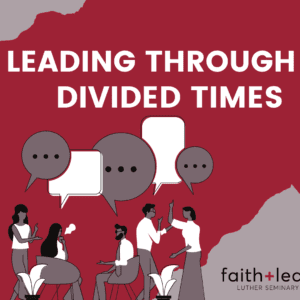Last December as I engaged in my annual goal setting process, I recognized two realities were following me into 2021: my spirit was extremely depleted and intense divisions permeated every arena of society. To live and lead well in the months ahead meant I had to face both realities.
Fast forward eleven months and I will admit it has been a trying year. The ray of hope I longed for ringing in the new year did not appear. In fact, anxiety and dissonance increased as we corporately and personally navigated the complexities of COVID, political rhetoric, racial injustice, and personal loss. To move from surviving to thriving required a flexible perspective and resulted in six discoveries.
It’s not about you!
It is important to remember the heaviness in the air and tenseness in conversations is not about you. Our current conditions are the result of many forces coming together to create “a perfect storm.” The divisions in communities are fueled by a variety of realities that have nothing to do with you or me. Yet, here we are with estranged family relationships and heated debates with neighbors.
Rather than absorb the tension or take things personally, now is a time to step back and gain perspective. This simple yet profound change in my posture has been life-giving. Getting onto the balcony, as Heifetz and Linsky refer to it, gives us a flexible perspective and provides different angles of vision. It also takes the focus off of us. As we remove ourselves from the center we become less emotionally engaged and we can be curious and wonder. There is usually more to the story than what we see. This past year getting on the balcony has kept me out of several conflicts and at the same time it has increased my empathy for other people. This week, practice getting on the balcony and see what difference it makes for you.
Questions are more helpful than answers
I’m an idea person, so I enter most conversations eager to engage ideas. Yet when ideologies are fueling divisions, sources of truth vary, and debates are personal, providing a thoughtful response or facts on any topic does little to change people’s behavior or provide constructive paths forward. Questions, on the other hand, create openings for going beyond the presenting issue, and when accompanied by careful listening, signal honor and respect.
- What was that experience like for you?
- Can you share more about why that is important to you?
- How does that make you feel?
Questions can shift debates to meaningful personal connections and widen all of our perspectives. Next time you feel a debate coming on, experiment by asking a probing question and discover what happens.
See people and tend relationships
I have been reminded over and over again that this has been a tough year for many people. Life continued on while each of us was living within our personal bubbles. Babies were born, people were laid off, parents died, friends were diagnosed with cancer, family members retired, and weddings happened. Wrapped up in the ordinary and extraordinary moments of life were questions of meaning, desires for being in community, and grief related to our inability to partake in common rituals and traditions.
And reentry is hard. Circumstances are constantly changing and expectations are unclear. There is a dire need among us to be seen. Seeing each other’s humanity happens within the particulars of relationships and the paradox of life. We know joy exists simultaneously with sorrow and resiliency is a sibling of vulnerability. We all wrestle with being independent as well as dependent. And we know we have the capacity to love and hate. How might we see each other’s struggle to be human? How can we tend to important relationships? Might we:
- Send a note of encouragement.
- Call for no reason.
- Deliver cookies on a hard day.
- Pray for another’s need.
- Walk with a neighbor.
- Make a coffee date with co-workers.
In these divided times, little acts of kindness are more than niceties. They communicate a flexible perspective, value and care in powerful ways.
Check-in with yourself
The weekly routines and self-care practices that once held us have been disrupted and we are regularly reminded our energy is limited. To make things worse, living and leading well in today’s conditions demands a greater amount of relational, emotional, and cultural intelligence. We are exhausted even on days we don’t face major crises. And, ironically, we are the only ones who can discern what self-care looks like for ourselves. Even as demands pile up, we must give ourselves permission to let go of other people’s expectations and discover practices that are life-giving for us.
Start with a self-care practice. Reflect on how it went and then try again. This past year I’ve prayed on my bike, participated in diverse online ministries, used art as a means for dwelling in Scripture, written poetry as prayers of lament, and learned the healing power of being in nature. I have also had impromptu lunches with friends, sent cards and care packages, and asked others to pray for me.
- Right now, what does your soul need?
- Which relational practices feed you?
- What keeps you from caring for yourself?
- Which experiment might you try in the next few days?
Keep learning
New capacities are needed to live well in this moment. Conflict and uncertainty about the future are real. The ability to show up in the midst of struggles and create holding environments requires particular skills and lots of practice. What do you need to learn? Communicating effectively in a digital age requires a shift in mindset and expertise with certain tools. There is an urgent need for leaders to see injustice and work for change with and for marginalized people. The list of new capacities is long and it is easy to feel inadequate. Yet the brave move is to embrace our ability to be lifelong learners with flexible perspectives. Opportunities for learning are endless and teachers come from expected and unexpected places. Learning engages us in the challenges. Learning partners provide support and encouragement. Where will you start? Who might you learn with?
Stay focused
When our daughter was young she used to tease me when I got distracted. She would get my attention and as she pointed two fingers to her eyes she would look straight at me and say, “Mom, focus.” Staying focused is not a new concern, but without it we miss what’s central to our lives and ministry. Knowing our why motivates us to do hard things. Focus reminds us comfort is overrated, winning arguments is secondary to nurturing relationships, and healthy patterns are not created overnight. Naming and claiming our values, goals, and view of abundant life not only helps us make small decisions each day, it also pushes us to go the extra mile and do hard things.
One way I remain focused is by choosing a word that encompasses my goals for the year. I write the word on a card and place it near my desk so I see it everyday. That powerful practice anchors my days and frees me to focus on what is most important.
Your turn
I wish I could offer a formula for living and leading well in divided times, but I can’t. What I can testify to is that trusting God’s way of life is abundant no matter the circumstances and leaning into these concepts and experimenting your way forward is transformational. May these lessons be in a small gift to you in these unprecedented days, as you strive to live and lead well.




